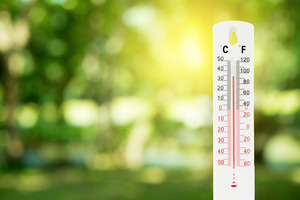
When you have sleep apnea, the quality of your slumber tends to suffer. This disorder can cause plenty of problems on its own, and it could potentially get even worse when it’s hot outside. How can high temperatures affect your sleep apnea, and what can you do about it? Here’s some helpful information from your sleep dentist.
High Temperatures and Sleep Apnea
As odd as it may seem, many studies indicate that hot weather can affect your ability to breathe. For people who are already suffering from respiratory issues like sleep apnea, this can make an already existing problem worse.
Additionally, hot weather can potentially stop you from getting a good night’s rest. Your body’s temperature naturally goes down as you fall asleep. If the air around you is appropriately cool, then it’s easier for your body to reach the proper sleeping temperature. But if it’s too hot, then falling and staying asleep will be much harder – which is the last problem you want to have if you have already been diagnosed with sleep apnea.
What Happens If Sleep Apnea is Left Untreated?
Ignoring sleep apnea can have serious consequences, especially if hot weather is making your symptoms more severe. Left untreated, the disorder can:
- Cause you to feel exhausted during the day.
- Increase your risk of accidents while driving or operating heavy machinery.
- Lead to cognitive issues such as memory problems and being unable to concentrate.
- Increase your risk for heart attacks and strokes.
- Cause symptoms of depression.
In short, sleep apnea is a very dangerous condition, and it always pays to take precautions to prevent it from worsening.
How Sleep Apnea Can Be Managed When It’s Hot
You may not be able to change the weather, but you can change the temperature of your bedroom thanks to air conditioning. It may add to your electric bill, but you’ll also enjoy the improved quality of life that comes with getting better sleep.
To help keep yourself as cool as possible at night, you might consider setting up a fan next to your bed. If necessary, you can remove the comforter and sleep under the sheets.
No matter what the weather is like outside, you should seek treatment for your sleep apnea from a qualified professional. Many people benefit from CPAP therapy, but if the machine is too uncomfortable for you, you can speak to a sleep dentist about having a sleep apnea oral appliance made.
About the Author
Dr. Jay A. Nelson has completed over 500 hours of continuing education in the field of dental sleep medicine, and he has helped more than 1000 patients overcome their sleep breathing disorders. His current practice specifically focuses on sleep apnea and snoring as well as TMJ issues. To schedule a consultation with Dr. Nelson at Nelson Dental Sleep Medicine in Wesley Chapel, visit his website or call (813) 733-4169.
